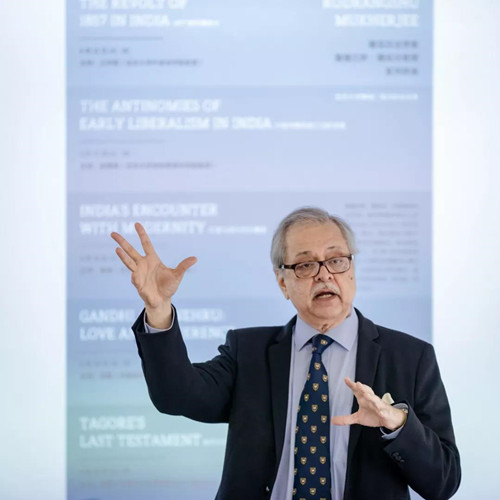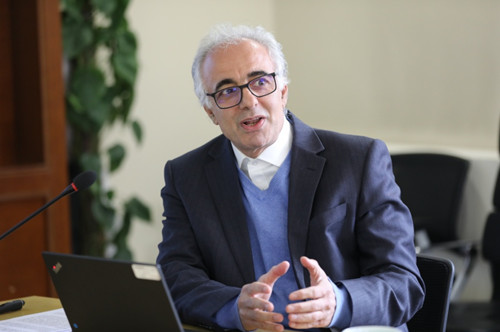Peking University, May 17, 2019: The Conference on Dialogue of Asian Civilizations (CDAC) opened in Beijing on May 15. Participants from 47 Asian countries, together with those from outside the Asia, gathered on Wednesday to celebrate cultural diversity, enhance cultural bonds, and to foster unity as a community.
At the opening ceremony, President Xi Jinping stressed in his keynote speech that the deepening of people-to-people exchanges is an important way to overcome misunderstandings, and exchanges and mutual learning among civilizations should be conducted in a reciprocal and equal manner. Scholars worldwide called for more mutual learning and exchanges between different cultures in Asia as they echoed President Xi Jinping's appeal to promote mutual respect and equal treatment among civilizations.
The night before the opening of CDAC, domestic media interviewed a number of visiting scholars of the Institute of Humanities and Social Sciences, Peking University. Rudrangshu Mukherjee, principal and history professor of Ashoka University, Hans van de Ven, professor of contemporary Chinese history from the Faculty of Asian and Middle Eastern Studies of Cambridge University, were interviewed by CDAC special program Encountering Civilization; visiting scholar Hassan Fazeli Nashli from the Department of Archeology, University of Tehran was interviewed in CGTN talk show Master Talk.
Professor Mukherjee, as the interviewee of the first episode of Encountering Civilization, elaborated on the major contributions Indian civilization has made to human civilization and offered a historical perspective on the relationship between China and India. In his opinion, the influence of Indian culture on the world is presented mainly in the spreading of teachings of Buddhism and the spirit of "Satyagraha" advocated and practiced by Mahatma Gandhi. Mukherjee expressed great anticipation for the upcoming conference and stressed that the more platforms there are for intercultural communication, the more opportunities there will be for different cultures to exchange and learn from each other, so as to achieve harmonious coexistence of different cultures.

Professor Mukherjee giving a lecture
Professor Hans van de Ven, who was also the guest of the special program, has been devoted to the study of contemporary Chinese history. He pointed out that traditional Chinese culture is diverse, not only containing world-renowned Confucianism but also the culture of Taoism, Buddhism, Christianity, etc, and that cultures in different regions also present different styles. Professor Hans also stressed that when looking for the answer to the question "what is culture", we should always keep in mind that culture is diverse and dynamic and that in today's global environment, countries should actively engage in intercultural communication and work together to get ready for various challenges facing mankind such as environmental pollution, instead of always arguing about the so-called “clash of civilizations”.

Professor Hans van de Ven delivering a speech
Professor Nashli is a world-recognized expert in archaeology. This semester, he was invited by the Institute of Humanities and Social Science and the School of Archaeology and Museology, to offer a course entitled "Archaeology in Iran: from the Paleolithic Age to the Achaemenid Dynasty" at Peking University. He told CGTN that according to archaeological findings, cultural exchange between Asian civilizations including Syria, Mesopotamia, Persia (ancient Iran), the Magan (ancient Oman), Maluha (ancient India), Diramon (ancient Arabia) and China, started as early as 4500 years ago. He believes that CDAC provides a great platform for cultural exchanges and mutual learning among Asian countries and that it works as a bridge of friendship and of mutual understanding between different cultures. Professor Nashili also pointed out that the civilizations of Asian countries have a lot in common, and it is necessary to analyze the diffusion of cultures and traditions from the perspective of history, archaeology and other fields as well.

Professor Nashili giving an academic presentation
Themed on "An Asian Community of inter-civilization exchanges, mutual learning and a shared future" , CDAC includes an opening ceremony, parallel sub-forums, an Asian culture carnival, Asian Civilization Week activities and other four sections, involving more than 110 activities, fully demonstrating the colorful charm of Asian civilization and Chinese culture. The event aims at boosting self and mutual confidence among Asian civilizations as well as to promote what China sees as "spiritual connectivity", conducive to regional peace and common prosperity.
Written by: Qiu Kanghua
Edited by: Fu Wenyun


